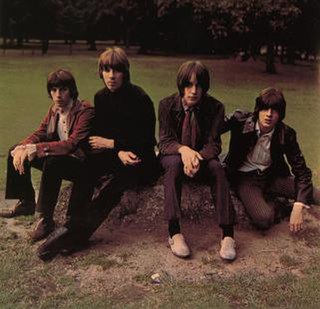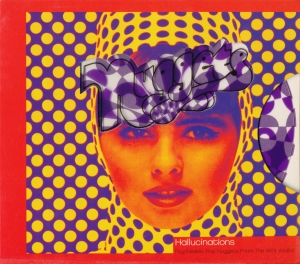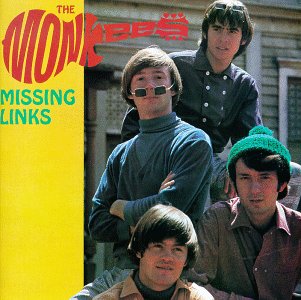
The Monkees were an American pop rock band formed in Los Angeles in the mid-1960s. The band consisted of Micky Dolenz, Davy Jones, Michael Nesmith, and Peter Tork. Spurred by the success of the television show of the same name, the Monkees were one of the most successful bands of the late 1960s. With international hits, four chart-topping albums and three chart-topping songs, they sold more than 75 million records worldwide.

The Nazz was an American rock band formed in Philadelphia in 1967. The group was founded by guitarist and main songwriter Todd Rundgren and bassist Carson Van Osten. Drummer Thom Mooney and vocalist/keyboardist Robert "Stewkey" Antoni joined soon after. The group is best known for their debut single "Open My Eyes”, and "Hello It's Me".

Nuggets: Original Artyfacts from the First Psychedelic Era is a compilation album of American psychedelic and garage rock singles that were released during the mid-to-late 1960s. It was created by Lenny Kaye, who was a writer and clerk at the Village Oldies record shop in New York. He would later become the lead guitarist for the Patti Smith Group. Kaye produced Nuggets under the supervision of Elektra Records founder Jac Holzman. Kaye conceived the project as a series of roughly eight LP installments focusing on different US regions, but Elektra convinced him that one double album would be more commercially viable. It was released on LP by Elektra in 1972 with liner notes by Kaye that contained one of the first uses of the term "punk rock". It was reissued with a new cover design by Sire Records in 1976. In the 1980s, Rhino Records issued Nuggets in a series of fifteen installments, and in 1998 as a 4-cd box set.

Pisces, Aquarius, Capricorn & Jones Ltd. is the fourth album by the Monkees. It was released on November 6, 1967, during a period when the band exerted more control over their music and performed many of the instruments themselves. However, although the group had complete artistic control over the proceedings, they invited more outside contributions than on their previous album, Headquarters, and used session musicians to complement their sound. The album also featured one of the first uses of the Moog synthesizer in popular music. Pisces, Aquarius, Capricorn & Jones Ltd. sold over three million copies. It was the band's fourth consecutive album to reach No. 1 on the U.S. Billboard 200.

Headquarters is the third studio album by the American pop rock band the Monkees, released in 1967 by Colgems Records. It was issued after the first season of their television series had concluded and was the first album on which the group members made substantial songwriting and instrumental contributions, rather than relying on session musicians and professional songwriters. After a struggle for creative autonomy with their record label, the group had been allowed, to a degree, to record by themselves. Headquarters became the group's third consecutive No. 1 album on the Billboard 200 chart and was certified double platinum in the United States with sales of more than two million copies within the first two months of release. It also peaked at No. 2 on the UK charts. It is included in the 2006 book 1001 Albums You Must Hear Before You Die.

Changes is the ninth studio album by the American pop rock band the Monkees, released in 1970 by Colgems Records. The album was issued after Michael Nesmith's exit from the band, leaving only Micky Dolenz and Davy Jones to fulfill the recording contract they had signed in the mid-1960s. Changes was their last new album for Colgems Records and the group's last album of all new material until Pool It!, released in 1987.

The Birds, the Bees & the Monkees is the fifth studio album by the American pop rock band the Monkees, released in 1968 by Colgems Records. It was the first album released after the cancellation of their TV show and subsequently was their first not to reach No. 1 on the U.S. Billboard 200, peaking at No. 3, and their first not to chart in the UK, with their four previous efforts all having reached the top ten. The album has sold over a million copies.

Head is the sixth studio album by the American pop rock band the Monkees, released in 1968 by Colgems Records, and the soundtrack to the film of the same name. The album primarily consists of musique concrète pieces assembled from the film's dialogue, while the six new songs encompass genres such as psychedelic music, lo-fi, acid rock and Broadway theatre.

Hallucinations: Psychedelic Pop Nuggets from the WEA Vaults is a 2004 compilation album released by Rhino Handmade, one of two new compilations using the Nuggets name. As with all Rhino Handmade releases, it was only available online, and a limited number of copies were pressed. All 7500 copies are currently sold out.

Missing Links is a compilation album of rare and previously unreleased songs by the American pop rock band the Monkees, issued by Rhino Records in 1987. It is the first volume of a three-volume set, followed by Missing Links Volume Two in 1990 and Missing Links Volume Three in 1996.

Come to the Sunshine: Soft Pop Nuggets from the WEA Vaults is a 2004 compilation album released by Rhino Handmade, one of two new compilations using the Nuggets name.

Missing Links Volume Two is a compilation album of rare and previously unreleased songs by the American pop rock band the Monkees, issued by Rhino Records in 1990. It is the second volume of a three-volume set, preceded by Missing Links in 1987 and followed by Missing Links Volume Three in 1996.
Nuggets is a series of compilation albums, started by Elektra Records in 1972 and continued by Rhino Records thereafter. The series focuses primarily on relatively obscure garage and psychedelic rock songs from the 1960s, but with some hits and pop-oriented songs also included.

The Monkees' discography spans over 50 years, from the release of their first single, "Last Train to Clarksville" in August 1966 to their final live album The Mike and Micky Show in April 2020. Their discography is complicated due to the large volume of unique releases in many international markets, the release of many recordings not credited to the Monkees for lack of rights to the trademark, and the existence of many bootleg, promotional, and novelty recordings that are beyond the scope of this article.

Where the Action Is! Los Angeles Nuggets: 1965–1968 is the fifth box set in Rhino Records' Nuggets series, released September 22, 2009. The set's four discs each focus on a different aspect of the underground rock music scene in and around Los Angeles at the end of the 1960s. The first disc, "On the Strip", features bands that rose out of the Sunset Strip scene; disc two, "Beyond the City", focuses on bands from the surrounding areas outside the city's borders; disc three, "The Studio Scene" covers bands' attempts to exploit the Los Angeles sound for a commercial audience; while disc four presents the movement away from psychedelic and garage rock towards the country rock sound which became popular in the city late in the decade. The boxed set was compiled and curated by Los Angeles native, Andrew Sandoval. On December 1, 2010, this project was nominated for a Grammy Award in the best Historical album category.

Edward Hoh was an American rock drummer who was active in the 1960s. Although primarily a studio session and touring drummer, Hoh exhibited a degree of originality and showmanship that set him apart and several of his contributions have been singled out for acknowledgment by music critics.

"She's Got Everything" is a song written by Ray Davies and released by English rock band the Kinks. It first appeared as the B-side of the Kinks' 1968 single, "Days".
Steve Stanley is an American music historian, reissue producer, graphic artist, musician, and the founder of Now Sounds, a reissue record label established in 2007 and distributed by Cherry Red Records.

"Lincoln County" is a 1968 song by British musician Dave Davies, who is best known as a guitarist for the rock band the Kinks. It was his third single.
"Do It in the Name of Love" is a song written by Bobby Bloom and Neil Brian Goldberg.















